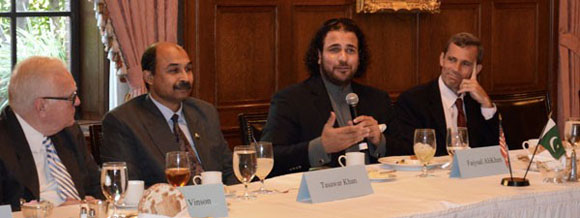
The Taliban in Afghanistan have fragmented, and the biggest challenge facing the country as the US prepares to withdraw its troops is primarily economic, not military, according to Faiysal AliKhan, a businessman and policy expert from Pakistan. Speaking to a round table of Los Angeles World Affairs Council directors and International Circle members over lunch Wednesday, AliKhan said he was generally optimistic for the future of Afghanistan and the region, largely because a younger generation is coming of age and seeking a life that is different from the last 30 years of almost unrelenting war.
“The head of TOLO News, Afghanistan’s main news channel, is 28 years old – and their main anchor is 24 – they are building a very different narrative about Afghanistan from the generation who fled the war and became refugees in Pakistan [after the Soviet invasion]… they have no appetite for continued warfare after 30 years.”
A similar age gap has developed inside the Taliban. Their top leaders, many of whom are based in Pakistan, come from an older generation of self-styled freedom fighters, while the local commanders on the ground are younger men with a couple of dozen troops, and they act opportunistically and semi-autonomously, often as much out of local economic interests as they do out of a commitment to fighting the central government in Kabul. “The Taliban seem to be one blanket group, but in fact they have become very fragmented – on the ground some are involved in mining, some are taxing the fuel trucks that bring oil in, some work in the opium trade… you have lots of non-state actors, many of them non-ideological, working for their own economic interests.” This does not mean the Taliban are not a threat, but they can be engaged and partly neutralized on an economic level, not just on a military level.
It does not help that Afghanistan’s recent presidential election is being disputed, with the announced winner, Ashraf Ghani, being accused of massive voter fraud by the runner-up, Abdullah Abdullah. But AliKhan said that after an international audit of the votes he was “confident” that a brokered solution was likely in which both men will serve in a unity government. “At the moment a little bit of posturing and face-saving is required.”
According to AliKhan the main key to addressing Afghanistan’s future – including the threat from the Taliban - is economic. Up to now the Karzai government has only focused on supporting a war economy, but what is required is a shift to focus on business and trade, easing regulations and encouraging investment. "Ashraf Ghani [the announced winner of the presidential vote] has a lot of young people who want to help – if he can prove he is for real a lot of these young people will come back from abroad and contribute.” But if the next government cannot move quickly to open the doors to business and investment, then they will lose support domestically, and Afghanistan’s neighbors will once again step in and start exploiting the country for their own purposes, as has happened so many times before.
Pakistan, he said, has also suffered considerably from the extended warfare in Afghanistan, which has radicalized a whole group of young Pakistani men, many of whom are fighting against the state inside Pakistan itself in a conflict that has claimed some 50,000 lives. But for all its challenges, AliKhan said there is a commitment to change in Pakistan, “because there is a recognition we face an existential threat to our country.” He pointed out that the military is now being led by a new generation of generals who have had experience fighting the Pakistani Taliban in the western frontier and understand the real threat posed by the extremists – “these younger generals are no paper-pushers,” he said.
AliKhan said he was even cautiously optimistic about the future of India-Pakistan relations. The recent election of Prime Minister Narendra Modi was not initially well-received in Pakistan, where he was perceived “as a hawk who is very anti-Pakistan and anti-Islam.” But looking deeper Modi appears to have a pro-business agenda, and may be someone that Pakistan can work with.
Asked about the recent announcement by al Qaeda that it would open a new branch in India, AliKhan said that it appeared “the al Qaeda groups are fearful they are losing the battle for recruitment to ISIS, who are more appealing to the radicalized youth.” He said extremists from north Africa all the way to central Asia have been very good at telling their own narrative – “however distorted, it is still very succinct messaging, very consistent, and it connects people.” And at the same time right wing conservatives in India have increased their anti-Islamic rhetoric, for example by trying to stop Hindu and Muslim youth from dancing together at festivals, out of fear that young Muslim men would try to marry Hindu girls in what they are calling “love jihad” to convert the girls to Islam.
The idea of a “love jihad” may exist only in the imagination of diehard Hindu conservatives. AliKhan’s bigger message is that a younger generation across the region is moving beyond a mindset of war and conflict in search of a different way of life. One can only hope that they find it.
Roundtable lunches are held for directors and members of the International Circle of the Los Angeles World Affairs Council about twice a month. If you are interested in learning about roundtable events and other benefits of joining the International Circle, please contact Susan Hwang at (424) 258-6160, or by email at shwang@lawac.org
